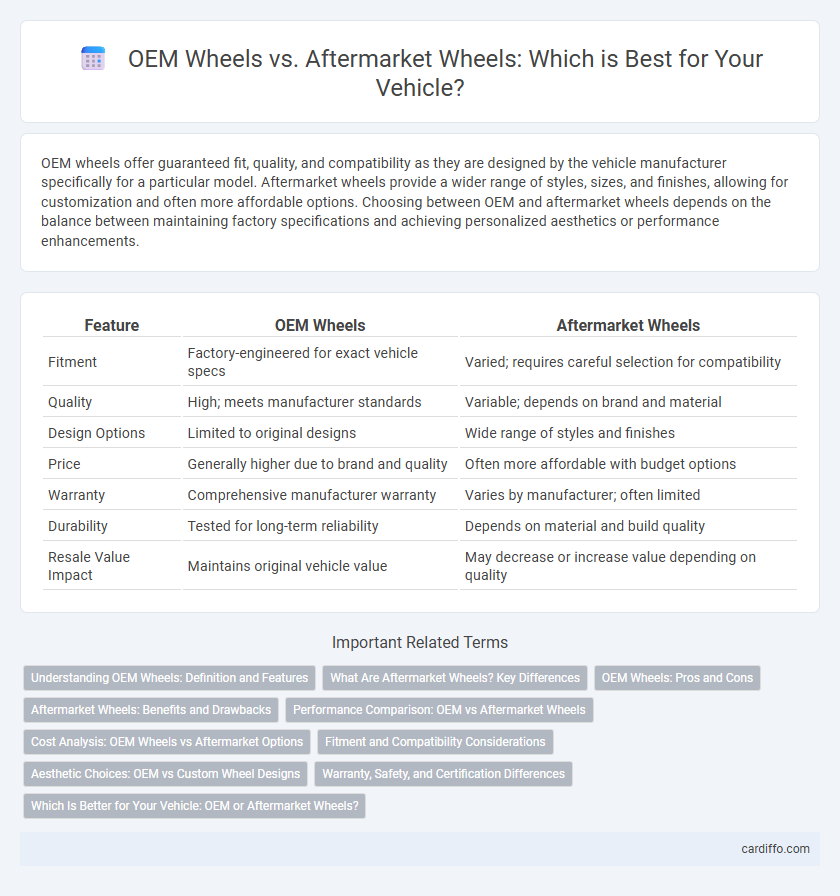OEM wheels offer guaranteed fit, quality, and compatibility as they are designed by the vehicle manufacturer specifically for a particular model. Aftermarket wheels provide a wider range of styles, sizes, and finishes, allowing for customization and often more affordable options. Choosing between OEM and aftermarket wheels depends on the balance between maintaining factory specifications and achieving personalized aesthetics or performance enhancements.
Table of Comparison
| Feature | OEM Wheels | Aftermarket Wheels |
|---|---|---|
| Fitment | Factory-engineered for exact vehicle specs | Varied; requires careful selection for compatibility |
| Quality | High; meets manufacturer standards | Variable; depends on brand and material |
| Design Options | Limited to original designs | Wide range of styles and finishes |
| Price | Generally higher due to brand and quality | Often more affordable with budget options |
| Warranty | Comprehensive manufacturer warranty | Varies by manufacturer; often limited |
| Durability | Tested for long-term reliability | Depends on material and build quality |
| Resale Value Impact | Maintains original vehicle value | May decrease or increase value depending on quality |
Understanding OEM Wheels: Definition and Features
OEM wheels are original equipment manufacturer wheels designed specifically for a vehicle by the car maker or authorized suppliers, ensuring precise fitment and compatibility with factory specifications. These wheels feature materials and engineering standards that meet the vehicle's safety and performance requirements, often tailored for optimal balance, durability, and aesthetic matching to the vehicle model. Understanding OEM wheels involves recognizing their role in maintaining manufacturer warranty coverage and preserving the vehicle's resale value.
What Are Aftermarket Wheels? Key Differences
Aftermarket wheels are replacement wheels produced by companies other than the original equipment manufacturer (OEM), designed to offer more diverse styles, sizes, and performance enhancements. Unlike OEM wheels that ensure exact fit and factory-level quality standards, aftermarket options provide customization opportunities for aesthetics and handling but may vary in quality and warranty coverage. These wheels often cater to enthusiasts seeking unique looks or improved performance at different price points compared to OEM counterparts.
OEM Wheels: Pros and Cons
OEM wheels offer precise fitment and compatibility with vehicle specifications, ensuring optimal performance and safety. They maintain the original manufacturer's warranty and retain the vehicle's resale value due to their authenticity. However, OEM wheels tend to be more expensive and offer limited design options compared to aftermarket alternatives.
Aftermarket Wheels: Benefits and Drawbacks
Aftermarket wheels offer a wider variety of styles, sizes, and finishes, allowing car owners to customize their vehicles for enhanced aesthetics and performance. These wheels are often more affordable than OEM options and can provide improved handling due to lighter materials like aluminum alloys. However, aftermarket wheels may vary in quality and fitment, potentially leading to issues such as vibrations, increased wear, or reduced compatibility with vehicle safety systems.
Performance Comparison: OEM vs Aftermarket Wheels
OEM wheels provide consistent performance tailored specifically to the vehicle's design, ensuring optimal fit, balance, and durability under standard driving conditions. Aftermarket wheels often offer enhanced performance benefits such as reduced weight for improved acceleration and handling, but variation in quality and fitment can affect reliability and ride comfort. Selecting aftermarket options with reputable manufacturing standards helps maximize performance gains without compromising safety or vehicle dynamics.
Cost Analysis: OEM Wheels vs Aftermarket Options
OEM wheels generally come at a higher upfront cost due to brand-specific design and guaranteed compatibility with the vehicle, often priced between $200 to $500 per wheel. Aftermarket wheels offer a broader price range, from as low as $100 to over $400 per wheel, providing budget-friendly options but varying in quality and fitment. Long-term costs may include potential expenses from premature wear or improper fit with aftermarket wheels, while OEM wheels typically ensure durability and manufacturer warranty coverage.
Fitment and Compatibility Considerations
OEM wheels offer guaranteed fitment and compatibility as they are designed specifically for the original vehicle model, ensuring proper bolt patterns, offset, and hub dimensions. Aftermarket wheels provide a wider range of styles and sizes but require careful attention to specifications such as bolt pattern, center bore, and offset to avoid issues with clearance and handling. Choosing the right wheels involves verifying compatibility with the vehicle's suspension, brakes, and overall geometry to maintain safety and performance.
Aesthetic Choices: OEM vs Custom Wheel Designs
OEM wheels typically offer a cohesive aesthetic that complements the vehicle's overall design, ensuring brand consistency and factory-grade finishes. Aftermarket wheels provide a broader range of custom designs, materials, and finishes, enabling vehicle owners to personalize their ride with unique styles, colors, and sizes. Custom wheel designs often enhance visual appeal and individuality but may require careful selection to maintain performance and compatibility.
Warranty, Safety, and Certification Differences
OEM wheels come with manufacturer-backed warranties that ensure compatibility and safety, meeting strict certification standards such as SAE and ISO. Aftermarket wheels may offer limited or no warranties, potentially compromising structural integrity and safety due to varying quality controls and inconsistent certification compliance. Choosing OEM wheels guarantees adherence to original equipment safety regulations, while aftermarket options require careful verification of certifications like JWL or VIA for reliable performance.
Which Is Better for Your Vehicle: OEM or Aftermarket Wheels?
OEM wheels offer guaranteed compatibility, precise fitment, and maintain the vehicle's original handling characteristics, ensuring optimal performance and safety. Aftermarket wheels provide a wider variety of styles, sizes, and finishes, allowing for customization and potentially lighter materials that can enhance aesthetics and performance. Choosing between OEM and aftermarket wheels depends on prioritizing factory reliability versus personalized design and performance enhancements.
OEM wheels vs aftermarket wheels Infographic

 cardiffo.com
cardiffo.com